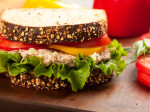 What’s the best excuse you’ve heard for skipping breakfast?.
What’s the best excuse you’ve heard for skipping breakfast?.
- “I ran out of time”
- “I wasn’t hungry”
- “I might gain weight”
- “I forgot”
- “If I eat too early I can’t stop eating all day”
- “I feel sick in the morning”
- “I’m trying to save money”
While these all seem like valid reasons for not eating, research has found that people who skip breakfast are more likely to lack vital nutrients like folate, calcium, iron, dietary fibre, Vitamins A,C, D and the B group vitamins. In fact breakfast skippers were more likely to snack on high fat, high energy snacks as the day progresses and gain weight than breakfast eaters.1
Apart from our every day work and things we call ‘routine’, there’s the special times in our lives when eating breakfast first could really make a difference to our enjoyment of the ‘big’ day. If you’re heading out to a day at the show or the races; attending a wedding, going on holiday, a trip overseas, an exam or graduation, a sports tournament, a photo shoot, the first day at work. Step up to breakfast first..
The benefits of breakfast eating
As the first meal of the day breakfast provides energy and nutrients critical to working and learning activities 2 So eat breakfast if you are keen to ramp up your productivity.
1. Improve your personal power and recovery
Glucose is the main fuel for brain function and for optimal cognitive function we require the maintenance of a stable blood glucose level within a range between 80-120mg/dL. 3,4 As blood glucose levels fall people physically notice hunger, fatigue and a decline in cognitive and work efficiency 5-8
To keep our blood glucose levels stable and our body functioning we store glucose and water as glycogen in our liver and muscles as a backup energy source.
In the morning our glycogen stores are depleted after digestion overnight 9
Eating breakfast provides an important opportunity to recover these lost energy stores and to kick start our day.
2. Prevent serious long-term illness
Breakfast eaters have a 35-50% lower risk of obesity and diabetes than those who skip breakfast or only eat it occasionally.10 Breakfast eaters also have a lower incidence of heart disease, elevated cholesterol levels, skin problems, bowel cancer, iron deficiency and fatigue.11
Much of these benefits are related to the type of foods that are eaten at breakfast. Wholegrain breads and cereals in particular are an important source of dietary fibre (soluble, insoluble fibre and resistant starch) which act as prebiotics, nourishing our gut bacteria (microbiome) important for gut health. Dietary fibre is also heart friendly, altering fat absorption, reducing weight and cholesterol levels.
3. Ensure body growth and repair
Breaking what for many can be a 7-8 hour fast provides growing children and the elderly with up to one-third of their required needs of energy and essential vitamins and minerals for tissue growth and repair. Every day we are all losing and replacing tissue.
4. Improve brain function and engagement
Children that go to school hungry are more likely to be apathetic, inattentive and disruptive. They also suffer reduced levels of responsiveness, concentration, memory and learning processes.12 Children who are energy deprived in this way are more likely to withdraw from play and exploration, sport and social interaction. What things could you also be missing out on?
5. Build sustainable energy
Foods release their energy at different rates of time.The carbohydrate present in high fibre cereals, fruit and wholegrain toast can provide energy for between ½ to 2hrs.
Adding healthy unsaturated fats such as margarine, nuts and seeds as well as protein in the form of an egg, cheese or baked beans on toast; or a pottle of yoghurt to fruit and cereal can help to stabilise your energy and blood sugar levels for up to 4-5 hours.
If you are serious about sport then breakfast is an essential ingredient to improve performance, aid muscle adaptions and recovery.
Breakfast scenarios
Breaking the fast from the night before can come in a variety of different forms depending on your age, activity level, work and lifestyle. e.g:
One meal plus a mid-morning snack
Having wholegrain cereal, fruit and low-fat yoghurt plus a slice of wholegrain toast is a great way to start the day with plenty of dietary fibre, protein, vitamins and minerals. This can still leave room for some fruit or small muffin mid-morning especially if you are active or like children still growing.
Two breakfasts are common with athletes
For people getting up early e.g. 5.30am taking children to sports training, starting work on a farm, travelling for work or involved in heavy construction or the forestry industry energy demands can be very high.
Starting with a breakfast of cereal and fruit, or toast and banana can be a good way to get started for the day but needs to be followed up with a more complete second breakfast such as a poached egg on toast or porridge, berries and yoghurt around 8am before school or work…or maybe a filled roll if you are eating away from home.
Shift workers e.g. nurses and taxi drivers sometimes find this routine works well. If they finish their night shift at 7am, come home to cereal and fruit go to bed and then around 2pm they have the rest of their breakfast e.g. an egg on two pieces of toast or (say) soup and a toasted sandwich, then their usual dinner at 5-6pm and their ‘lunch’ (e.g. filled rolls or wrap and fruit) between 10pm and 2am.
Eating in this way, and factoring in some exercise mid-afternoon, can help shiftworkers to keep their weight and mood on an even keel whilst also catching up on some valuable Vitamin D from the sun.
Three small meals work, if appetites are small but needs are big
This may apply to some elderly or frail people who are struggling to gain weight.
Elderly people often wake up early (say) 6am and make a cup of tea. This can be a good time for them to have their morning tea early such as a muffin, pikelet or small scone then maybe go back to bed
Then breakfast might follow at 9am such as fruit, cereal and toast and another second breakfast at 10-11am such as a small protein filled sandwich or banana and yoghurt.
Tips for those who are slow to warm up to breakfast
- Start with small amounts of fruit and wholegrain cereal with fat-reduced milk and yoghurt.
- Then add a mid-morning snack such as a small muffin or piece of fruit or wholegrain bread especially if you are active and your energy demands are high.
- Remember to have a drink such as a cup of tea, glass of milk or water and keep well hydrated throughout the day.
- If you or your children are too rushed in the morning to eat breakfast then try getting better organised the night before. Reduce the morning pressures by setting the table, put out the cereals and breakfast spreads, have the toaster ready. Organise what clothes children can put on, their library books if they need returning and have school and sports bags packed and ready to go.
- Parents need to lead by example. It is impossible to change the habits of a child if you don’t demonstrate what to do. So try to prioritise breakfast eating for the whole family and feel the benefit too of better health and a brighter day.
If you have food intolerances or health issues, or you need specific sports plans, quantities and advice for you or your family, then contact me I’m happy to be your nutrition coach.
Other articles by Lea on similar topics
Are dietary guidelines still relevant today?
Brain food: Part 2 Thinking food
References
- Schimelpfening N, Healthline June 17, 2021 https://www.healthline.com/health-news/study-finds-people-who-skip-breakfast-miss-vital-nutrients-snack-more
- Tolfrey K, Zakrzewski JK. Breakfast, glycaemic index and health in young people. J Sport Health Sci. 2012;1(3):149–59.
- Sunram-Lea SI, Foster JK, Durlach P, Perez C. The effect of retrograde and anterograde glucose administration on memory performance in healthy young adults. Behav Brain Res. 2002;134(1-2):505–16.
- Morohoshi E, Adachi S. Effect of the different types of interventions on meal aimed to control the postprandial blood glucose levels: profiles of young healthy women monitored by the self measuring method. J Jpn Health Med Assoc. 2015;23:279–88.
- Kennedy DO, Scholey AB. Glucose administration, heart rate and cognitive performance: effects of increasing mental effort. Psychopharmacology (Berl). 2000;149(1):63–71.
- Veasey RC, Gonzalez JT, Kennedy DO, Haskell CF, Stevenson E. Breakfast consumption and exercise interact to affect appetite, cognitive performance and mood later in the day. Appetite. 2012;59(2):636–41.
- Wesnes KA, Pincock C, Richardson D, Helm G, Hails S. Breakfast reduces declines in attention and memory over the morning in schoolchildren. Appetite. 2003;41(3):329–31.
- Hoyland A, Lawton C, Dye L. Influence of breakfast on cognitive performance, appetite and mood in healthy young adults. Appetite. 2008;50(2):560–6.
- Astbury NM, Taylor MA, Macdonald IA. Breakfast consumption affects appetite, energy intake, and the metabolic and endocrine responses to foods consumed later in the day in male habitual breakfast eaters. J Nutr. 2011;141(7):1381–9.
- Leidy HJ. The benefits of breakfast consumption to combat obesity and diabetes in young people. Am J Lifestyle Med. 2012;7(2):99–103.
- Timlin MT, Pereira MA. Breakfast frequency and quality in the etiology of adult obesity and chronic diseases. Nutr Rev. 2007;65(6):268–81.
- Hoyland A, Dye L, Lawton CL. A systematic review of the effect of breakfast on the cognitive performance of children and adolescents. Nutr Res Rev. 2009;22(2):220–43.
































































Leave a Reply